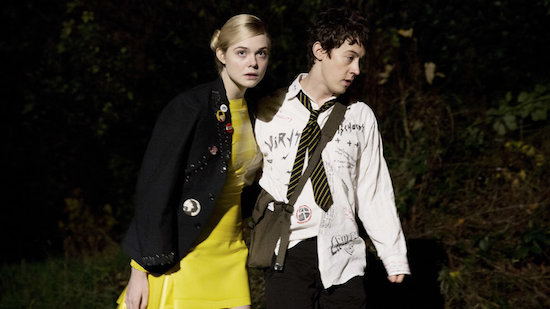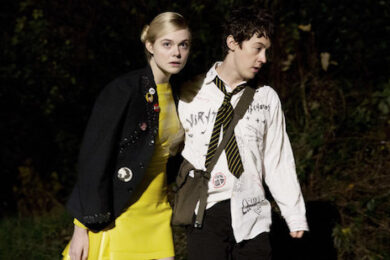How To Talk To Girls At Party (HTTTGAP) sees James Cameron Mitchell return to the directorial helms, eight years since the sombre Rabbit Hole. HTTTGAP follows a completely different trajectory, evocative of Mitchell’s earlier work, the subversive transgender musical turned cult movie Hedwig and The Angry Inch or it’s follow up, the erotic comedy drama Shortbus. Kidman reappears as a Vivienne Westwood- David Bowie punk hybrid reject, side-lined to a microscopic punk scene of late 70s Croydon. As the film treads on more comedic notes, Mitchell amusingly introduces an outlandish alien narrative, a whole colony of them, all stylised and decked out in Barbarella PVC and with a penchant for fisting. The ‘hot chick’ alien women from Zoltan of 2000’s Dude Where’s My Car fame comes to mind.
Based on the short story of the same name by Neil Gaiman, these humanised and highly sexualised – mostly female – depictions of these aliens, coupled with a rather flimsy and loose explanation of their intergalactic background, are heavily reminiscent of 80s comic sci-fi spoofs such as Earth Girls Are Easy and My Stepmother Is an Alien. There is an intentional un-Hollywood, DIY, B-movie aesthetic, yet Mitchell juxtaposes this by packing it with Hollywood A-listers and some big British names to boot.
HTTTGAP has received a mixed bag of reviews – and understandably so. The film is slightly problematic. Its narrative is often muddled up and aimless, with some strands never amount to anything and potentially promising ideas fall completely flat. Simultaneously, it’s salvaged by its wackiness, its subversiveness, the random humour and edgy cool. But ultimately it boils down to its superb high calibre cast, especially the parts of the hilariously deadpan aliens. There is an underlying sense, when watching HTTTGAP that Mitchell was having fun, dragging up sweet memories of his youth and possibly taking the piss.
We managed to interview Mitchell a few weeks back to talk to us about the film. An instantly likeable figure, articulate, funny with a healthy dose of sarcasm, keen to chat us about the political undercurrents of his film, the punk scene and queerness.
It’s been eight years since your last film. How have you found the comeback with HTTTGAP?
I’ve been busy with other stuff, acting and TV stuff. It’s been an interesting journey. We had a lot of fun doing HTTTGAP. Most of my films are different. They don’t fit into a genre. With kids nowadays, it’s hammered into their heads that things need to be into a certain genre. I don’t really subscribe to that. In terms of my films, they seem to find their audiences later. Hedwig was initially a flop on the screen and then on DVD it became a cult kind of thing. And I do think HTTTGAP will find its way.
The film has a low-fi aesthetic and the way it’s directed there’s an air of first-time film-maker to it. Was this intentional?
Yes! In effect most of my films and plays as well as what Neil Gaiman writes about are basically 70s midnight movies. We were inspired by David Lynch, Rocky Horror Show, Bob Fosse, Fame, and by Samuel Delany. We were both creatures of the 70s, of punk and all of our stuff has a flavour of ‘just do it’, ‘DIY’. Neil bemoans the fact that because some of his adaptations have been so expensively made, they have been dumbed down and lost some of its original wit and delicacy. And only now is he able to approve the projects himself, because now he is doing really well. So now, as he is stepping into things like American Gods and being show runner on Good Omens, it’s all much more representative of him. And it’s fantastic!
All my films are going to have that low-fi, punky feel. Even Rabbit Hole – we did it all, quite on the cheap. I was with the mentality of getting it out and people will find it. I’m not really a Hollywood person. However, I would take Hollywood money! I see it as money laundering.
You managed to rope in quite a few Hollywood names?
Well, actors like Nicole [Kidman] do a lot of the big jobs because they are told to do so and for the money. The mentality is that you can do the Marvel thing and then do whatever you want. The whatever-you-want thing tends to be something more interesting. They are doing it for scale and of course for it to be fun. I make a point for my sets being fun and entertaining.
You captured the Britishness of the era and the urban landscape of Croydon very well.
Well, I’m half British. My mother is Scottish. She grew up in Glasgow. I went to boarding school in Scotland for a couple of years. My grim 70s were enlightened by David Bowie and punk was part of my youth. I still laugh loudest with British comedians. I keep up with British culture and politics. It’s funny cause I’m doing this sitcom now which reminds me of all the realistic and modern-day acerbic comedy like Girls – and don’t me wrong, I’m enjoying it – but I kind of want things that are constantly funny and not waiting for the laugh. British comedy has or had that.
There’s also a fair bit British talent in the film.
Some of them are friends of mine, like Matt Lucas and Simon Amstell. Ruth Wilson, I met at a physical therapy session and I just asked her, “do you want to play an alien who fists humans?” and she said, “I’m in”. Other people I admired like Joanna Scanlan. She does unusual projects and she is a writer. I like the kind of workshop thing, like I’ll help you out, you help me out. My favourite discovery is the actor Edward Petherbridge. He plays the androgynous alien chief. He was just brilliant!
There is a prevailing queer sensibility to the film, even if there a heteronormative love story at the core it.
Well, I’m queer, so everything that is going to come out of me is queer. I mean I look at the film as a fairy-tale. A punk fairy-tale. I am not trying to recreate the Roxy Club. Nicole’s character, you can see, is in exile from the London scene. She had a run in with Vivienne Westwood. She is creating her own punk enclave in the suburbs, which sometimes did actually happen. Like Pete Shelley from the Buzzcocks. They were doing their own queer-ish thing. There was always the Poly Styrenes, the Siouxsie Siouxs and the likes of Steve Strange who were just queerer, more androgynous. That singer you see in the film was the lead singer of that band Selfish Cunt from ten or more so years ago. Danny Fields, a music manager friend, introduced me to him. He is very queer and very punk. He flirted with both those things that for most of his career.
What appeals to you about punk to make this film?
Punk to me was always like: I can’t define it, but I know it when I see it. Punk is one of those things – even to define it, it’s no longer punk. It changes from person to person. But I guess some things like: questioning the status quo and questioning conformism. Honouring the individual and the originality within an individual. It questioned fascism and authoritarianism. Punk, I guess, would smash, destroy stuff but also fix things, by putting out revolutionary ideas. I spent my formative years in the 80s and organisations such as Act Up, whose activism was aggressive but dealt with the very serious issue of the government’s negligence around AIDS. That was punk.
I often think now we see the right-wing / alt-right co-opting that sense of punk activism.
Totally! The alt-right got a little punky. Which in effect, makes it a little bit cooler for a younger audience. Like ‘Hey, look they are insurgent’. But just because they are insurgent doesn’t mean they are right. Like all this stuff with Trump and Brexit they are trying to censor to protect their interests rather than it being about the common good. It’s an interesting period. The National Front co-opted punk, and they are aggressive.
When I was young I just loved punk and thought it was important. And I think we need some of this attitude now. This force from Trump and other public dictators, you see people buckling under, resigned, exhausted. A constructive punk perhaps is exemplified by the likes of the Parkland teenagers, leading the conversation on gun control. Their sense of fuck this, we’ve had enough, this needs to change.
In terms of music reflecting of society, I don’t feel like there has been something in music lately to represent resistance. Would you agree?
Maybe in other areas, perhaps? We can see that certain comedians are setting forth. There are definitely grievances and things that need to be fixed. When it comes to music, I feel it’s ‘Oppression Olympics’. Maybe its taken over by social media? I feel it’s its slight warped with social media. This attitude of ‘I am outraged therefore I am’, instead of thinking what is the alternative? Should we not forgive? Or learn from mistakes? Instead of just mostly just accusing others? Like with people from the right, I want to know what these people’s grievances are. Let’s talk about it rather than censor it. I want to know when someone is racist. I want to know why Roseanne Barr is a bitch. I would like to talk to her. I want to know! Not sure people tweeting at each other is the same as actually confronting each other.
Its lazy activism. The hard work is getting a dialogue going. I would like to believe that most of these people aren’t horrible people. They are probably lazy, scared, and brainwashed. My mum was an anti-abortion activist. Her aim was to stop abortion. She wasn’t a horrible person. Really it’s just a distraction. Rich oligarchs in the US don’t care about abortion. They just use people’s feelings and fury and spur them on to vote for them, but to them it’s about lowering taxes. My film is political, it’s not so much in fashion. But I’m hopeful people will find it later and it will be a special thing.
You have mentioned previously that you introduced punk music to Elle Fanning. Did that help in getting an authentic performance from her?
When you are discovering punk for the first time, I think its quite pure. I think for her it was a natural evolution to the character. Whatever she was coming up with… we used it. Her way of discovering the music and the whole ethos was mirrored into the character and it was exactly the effect that we were looking for. You can’t just imitate. Punk is very much do-it-yourself. So her own version was very Elle. It wasn’t imitating Siouxsie Sioux; it was fresh…. If you are trying to just recreate something that happened in ‘77, make a documentary.
How to Talk To Girls At Parties is out now on DVD



